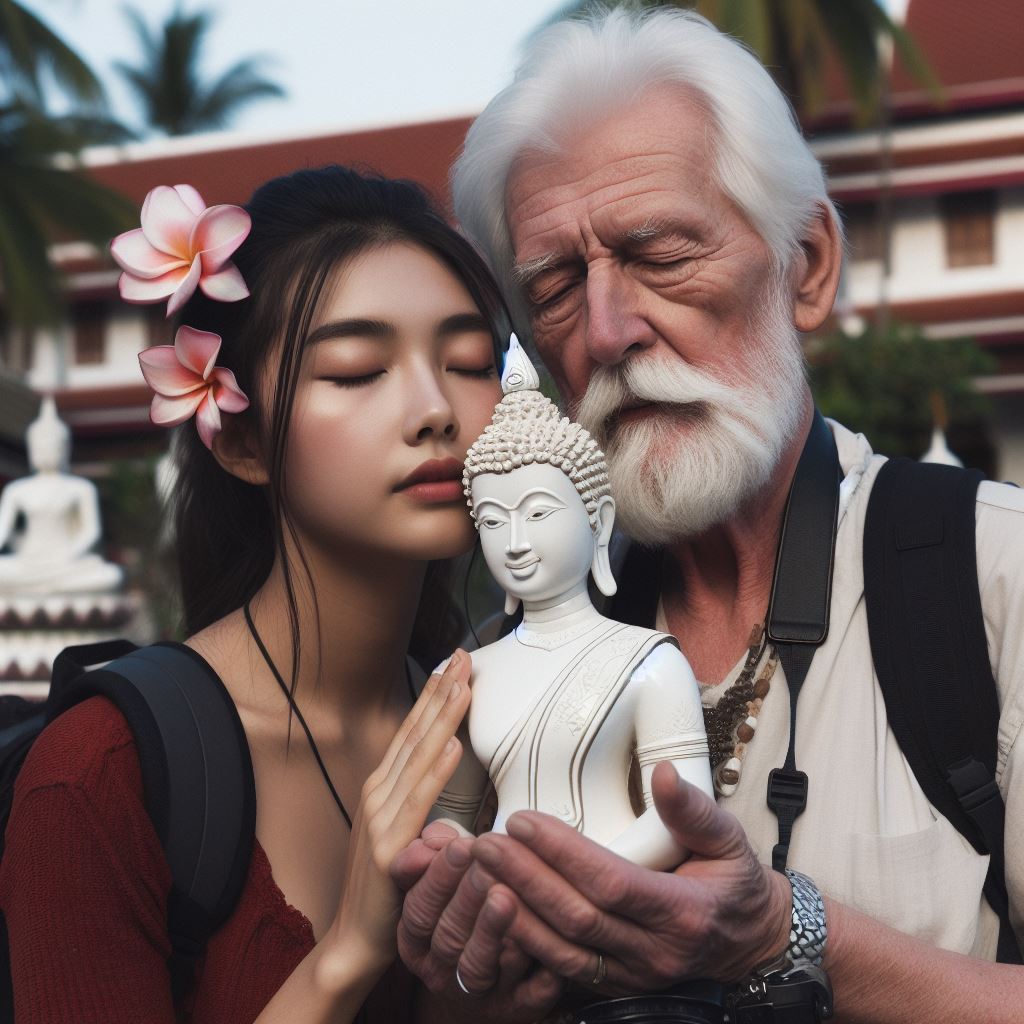細說泰國的租妻文化。
泰國的租妻文化是指一種特殊的社會現象,其中男性可以支付費用與女性進行合法的結婚模擬,而無需真正結婚或承擔長期責任。這種文化通常涉及男性支付給女性一定的金錢,以獲得她們陪伴、陪同參加活動,甚至模擬婚姻關係,包括參加家庭聚會或社交活動。在泰國,這種文化通常存在於旅遊熱點或城市地區,其中一些女性以此作為謀生的手段。這些女性通常被稱為「陪伴女士」,她們與男性客戶建立一種臨時性的關係,通常是為了提供情感支持、陪伴或社交互動。租妻文化可能會引發一些倫理和社會問題,例如性別不平等、對婚姻和家庭價值的扭曲以及對女性的剝削。然而,在某些情況下,這種文化也可以被視為一種商業交易,並被一些人視為提供服務的一種方式。
需要注意的是,泰國的租妻文化並不代表所有泰國人或泰國社會的價值觀,而是一種特殊的現象,受到各種因素的影響,包括經濟、社會和文化因素。
在泰國街頭,經常可以看到高大的歐美白人老頭,身邊跟著一位皮膚黝黑的嬌小年輕女性,這些女性通常年輕得多,與男性有著顯著的年齡差距,這種關係在當地又稱為「大象牽老鼠」或「大鯊魚與小龍蝦」,相當於沒有任何法律保護的臨時夫妻關係。女性需要扮演妻子、保母、地陪和翻譯的角色,而男方則需要支付租金以及所有同居期間的開銷,這樣看似各取所需,雙贏局面。通常租用的時間短期的有10天到2周,長的有半年到一年。
這些來自底層的泰國女子會被依照年齡、外表、學歷等條件被客戶篩選,價格約為每天1300到4500台幣不等,如果租用時間較長,價格則可能降至每天600台幣。許多退休的歐美人士每年領取60萬到70萬台幣的退休金,但在泰國生活成本相對較低,這筆錢在當地卻難以維持高標準的生活,因此他們來到泰國過上富裕的中上水平生活。除了夜晚的陪伴外,他們更需要24小時的看護照顧,這種看護在美國每天工作8小時,每日工資至少1.2萬台幣,這樣的費用幾乎可以在泰國租妻一個月。需求大的情況下,許多租妻仲介如雨後春筍般出現,他們會在機場或車站舉牌招攬客人,提供面試和簽訂契約等服務。這些交易也已經擴展到網絡上,有些網站會員超過300萬人,客人可以在抵達泰國前提前預訂租妻。
雖然泰國是佛教國家,但這種看似傷風敗俗的行為早在越戰時期就已經開始,如今在知名的芭塔雅(Pattaya)之前是一個小漁村,但在越戰爆發後,由於大量美軍在當地駐紮,這個小村莊的面貌發生巨大的變化。為緩解戰爭帶來的焦慮和孤獨,一些收入豐厚的美軍開始在芭塔雅租借風塵女子,白天他們在海灘上遊玩,晚上則沉浸在酒精和歡樂之中。這些風塵女子的生活開始發生改變,他們逐漸晉升為有產階級,擁有車和房,這種生活方式吸引更多底層女性渴望改變命運。白人通常喜歡小麥色或古銅膚色的矮小女性,這些族群被稱為黑珍珠,在租妻市場上最受歡迎。這些女性的最終夢想是能夠成為正式的妻子,擺脫貧困,一些白人甚至會在泰國留下資產或將女生帶回美國。
The rental wife culture in Thailand refers to a unique social phenomenon where men can pay fees to engage in a legal simulation of marriage with women without actually getting married or assuming long-term responsibilities. This culture typically involves men paying women a certain amount of money to accompany them, attend events with them, and even simulate marital relationships, including participating in family gatherings or social activities.
In Thailand, this culture is often found in tourist hotspots or urban areas, where some women use it as a means of livelihood. These women are often referred to as "companions" and establish temporary relationships with male clients, usually to provide emotional support, companionship, or social interaction.
The rental wife culture may raise some ethical and social issues, such as gender inequality, distortion of marriage and family values, and exploitation of women. However, in some cases, this culture can also be seen as a commercial transaction and a way for some individuals to provide services.
It is important to note that the rental wife culture in Thailand does not represent all Thai people or Thai society's values but is a specific phenomenon influenced by various factors, including economic, social, and cultural factors.
In the streets of Thailand, it is common to see tall elderly Caucasian men accompanied by petite young women with dark skin. These women are often much younger than the men, with a significant age difference between them. This relationship is locally known as "elephant pulling a mouse" or "big shark and small shrimp," equivalent to a temporary marital relationship without any legal protection. The women are expected to play the roles of wife, caregiver, companion, and interpreter, while the men are responsible for paying rent and covering all expenses during cohabitation, creating a seemingly mutually beneficial situation. Typically, short-term rentals last from 10 days to 2 weeks, while longer-term rentals range from six months to a year.
These Thai women from the lower strata are screened by clients based on criteria such as age, appearance, and education. Prices range from $1300 to 4500 NTD per day, but with longer rental periods, prices may drop to as low as $600 NTD Taiwanese dollars per day.
Many retired Europeans and Americans receive annual retirement pensions ranging from $600,000 to 700,000 NTD, which are insufficient to maintain a high standard of living in their home countries but can afford a comfortable upper-middle-class lifestyle in Thailand. Apart from nighttime companionship, they also require 24-hour care, which would cost at least $12,000 NTD per day in the United States, nearly equivalent to the monthly rent for a rental wife in Thailand.
Given the high demand, many rental wife intermediaries have emerged, offering services such as pick-up signs at airports or train stations and providing interview and contract signing services. These transactions have also expanded to the internet, with some websites having over 3 million members, allowing clients to pre-book rental wives before arriving in Thailand.
Although Thailand is a Buddhist country, these seemingly decadent behaviors have existed since the Vietnam War. Before Pattaya became a well-known destination, it was a small fishing village. However, after the outbreak of the Vietnam War, due to the large number of American troops stationed there, the face of this small village changed dramatically. To alleviate the anxiety and loneliness brought about by the war, some affluent American soldiers began to rent women in Pattaya. They would play on the beach during the day and indulge in alcohol and revelry at night. The lives of these women began to change, gradually ascending to the middle class, with cars and houses. This lifestyle attracted more lower-class women eager to change their destinies.
Unlike Asians' preference for fair skin, Caucasians prefer wheat-colored or bronze-skinned petite women. These groups are referred to as "black pearls" and are the most popular in the rental wife market. The ultimate dream of these women is to become official wives, escape poverty, and some Caucasians even leave assets in Thailand or take women back to the United States.




照片:DALLE3
- 1
- 2
- 3
- 4
